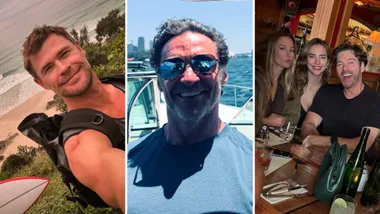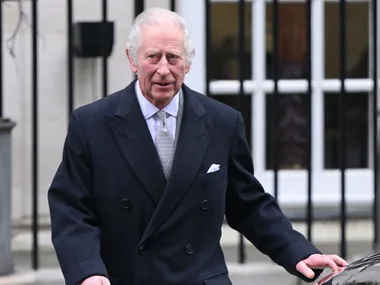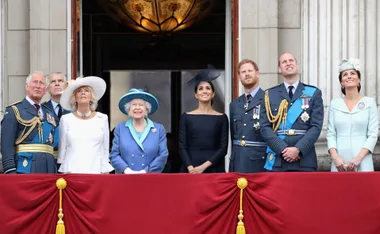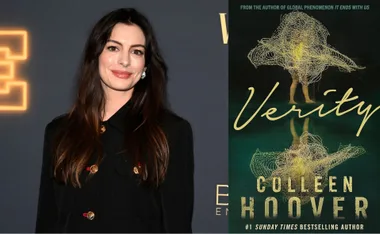CATHERINE GILDINER, author of the award- winning best-seller, Too Close To The Falls – A Memoir (Flamingo $21.95), which has been selected as the Great Read in the March issue of The Australian Women’s Weekly.
A touching and hilarious story, set in the 1950s in a small town, near Niagara Falls. Catherine is a wild child, who does 360 degree loops over swings and has to be rescued by cherry-pickers from tree-tops. Her pharmacist father decides work is the answer and has the four-year-old help Roy deliver prescriptions. Catherine rides around the countryside having some very big adventures which include getting lost in a snow storm, learning to gamble and meeting Marilyn Monroe. Catherine’s mother, who never cooks (so they eat out at restaurants every night) is just one in a parade of wonderful characters in a book you want to re-read the moment you’ve finished it.
Don’t miss it.
**Q. Your book made me laugh so much I cried.
A.** Really? Well, that’s just great! I didn’t know it was funny when I wrote it – isn’t that ridiculous? Talk about a writer not being on top of her work! When I first read the review in the Toronto newspaper that said it was funny, I thought,‘Oh my God – that’s like Mother Agnese (my teacher) said – they’re laughing at me and not with me.’
**Q. The bit where you’re being assessed by the psychiatrist is particularly funny.
A.** What is amazing about the psychiatrist, Dr Small, is that when I went to Lewiston, the town where the book is set, to give a talk, he came. He has since passed away – he was about 80 years old – and he was very nice. He brought me all the tests I’d done and held them up. But he had one huge complaint. He said he was very angry only about one thing, that I had called him puny. Everybody started to laugh because he is about five foot five … a tiny little New Yorker, right? He was just enraged.
**Q. I loved your efforts to try to second guess him during the tests.
A.** All I wanted to do was appear sane. That was my only purpose. Dr Small couldn’t believe that I’d remembered so much detail. I told him I thought my sanity was dependent on it, on each thing that I said, so naturally I remembered it.
**Q. Is it true you thought you had a normal childhood until others read your book?
A.** Yes! I thought I had a totally normal childhood. How it happened was, I invited my neighbour Helen, who is a writer and a painter, to join me when I went back to Lewiston for a school reunion. She said she’d like to go so she could do some painting in Niagara Falls. I warned her that it would be really boring, but she wanted to come anyway. On the way back to Toronto she didn’t say one word. “Why are you so quiet?” I asked her. She said she was completely blown away. We got there and everyone, like the whole town, talked about this guy named Roy. And that you rode around with him from early morning until late at night! And when you went to the general store people talked about how you drove the car when you were little, sitting on pillows. I said, ’Well, everybody drives in a small town.’ And she said, ‘What about how you smoked cigarettes when you were like a little kid?’ I said, ‘Well, everybody has the occasional cigarette!’ I honestly had no idea how different my childhood was.
And she mentioned that people talked about how my mother never made a meal. How we had no food in our house. I said, ‘Restaurants are full of people, Helen.’ She said, ‘But they’re not the same people every night, they’re different people.’ Helen’s like my mother’s age, and she just thought it was so strange. I said, ‘Well, I don’t think it’s the least bit unusual.’
Helen said everyone talked about Roy in such an amazing way, why don’t you just write up the story about when you went to his place overnight? So I wrote that one story up and I sent it to a publisher on Friday and Monday, I got back an advance! With a yellow post-it – typical loquacious Canadian style – which said, ‘Finish it.’
**Q. What a great response for you.
A.** Yes! But then I had to write the rest of the book! So only when the reviews came out did I realise my childhood was unusual. I think everyone thinks their childhood is normal. And it wasn’t unhappy. I thought it was apple pie/motherhood sort of thing, because my parents never had a fight! I thought, ‘Who wants to read about that?’
**Q. You enjoyed wonderful freedom as a child?
A.** Yes, and I didn’t realise that either. The only thing is that I thought other mothers were a bit odd. Like Mrs Schmitt – she would always say to her sons, ‘Where are you boys going?’ I used to think how very odd – like it’s not her business. I thought she was so nosey. I never told her the truth, not once. I never said where we were really going, even if we were doing something she wouldn’t object to, we just never told her. I thought it was odd that she was concerned about where they were and I thought she was invasive. I had no idea that it was my mother who was the other way around.
**Q. Looking back now, how do you see your mother?
A.** As having been a great mother because she never criticised me. I criticised my kids. But if something went wrong with me or someone complained about something I’d done, she’d say ‘Oh dear! Well, I don’t know, I just don’t think you’re meant for this town. You’re just meant for bigger things.’ She never criticised me and I think it gave me a lot of self-confidence. It’s really interesting because I gave a book talk last week to a bunch of eastern Europeans and they thought she was the most God awful mother they’d ever met. Because they’d lived through very hard times and they think that a mother who doesn’t give her child food is unloving. I said, ‘There’s all kinds of ways to love your child.’ And trusting in them and thinking that everything will be okay, assuming that they know what they’re doing. And I think she saw that it wasn’t going to work out with me to stay at home all the time – I was being really hyper. And she said, ‘Hey, this isn’t going anywhere.’
**Q. I liked her tolerance and acceptance of you, and the way she talked to you and encouraged you.
A.** I agree. She was a fabulous mother, she just wasn’t conventional. I didn’t understand that at the time. I thought all mothers talked to their kids that way. When I did a Phd in philosophy and science, I would always think, gee, this is an interesting way to look at it, I bet the professor will really like this – this is way back when there were no women in class, I’d be the only woman in science. And I think that came from my mother saying, ‘Oh that’s an interesting way to look at it.’ As if a four-year-old had an interesting way to make an igloo, I mean I’m sure it was boring. She would say, ‘That’s exactly what a very famous igloo maker would build.’ Part of the reason I named my book Too Close To the Falls, is when you give your kid a lot of freedom, you can get too close to the edge. And I think a few times I really did get too close to the edge, but I think you learn quickly. I think it is a great way to grow up, if you don’t go over the falls. I think I was right on the edge.
**Q. Literally as well, by the end of the book.
A.** Yes! I think the way they raised me was a bit on the edge. But also – I’m a psychologist as well, I own a private practice – people tell me, those who were born in the 50’s as well, that there were child molesters around then. There was incest, too. You just didn’t hear about it. Now I think people are way over-protective. I think the best thing you can do is to give your kids self-esteem and confidence.
**Q. Was your mother raised in a conventional way?
A.** Totally.
**Q. So she was just a very individual woman?
A.** Yes, her sister had five children and all of them became nuns and priests – she was very Catholic. She went to daily Mass, was very conventional in that way. The hardest chapter to write was my mother’s chapter. Because everything I said about my mother was true in one way and not true in another. In the sense that she was very, very different in some ways, while in others she was completely conventional. She would never have gone out of the house wearing the wrong colours in the Fall. Transitional colours, you know, all the other stuff – her purse matched her shoes matched her hat. Have you seen a movie called Far From Heaven? No. You should see it because about 10 people from Lewiston I haven’t seen in like 30 years, called me and said that is your mother. Maybe it’s not on there yet. It’s got Randy Quaid in it and the story is set in the ‘50s.
**Q. I’ll love it, because that’s my period, too.
A.** God, you sound like you’re about 25. My mother fitted perfectly into the ‘50s, she was a member of the garden club and the study club, and all that stuff, but then she’d close the door and go ‘Ooph! Thank God we don’t have to do that. ‘Lock the door, and don’t open it, no matter who knocks. Hit the floor!’ Nobody was allowed to move or make a shadow.
**Q. Your book has been immensely successful – how long has it been on the best-seller list?
A.** 100 weeks.
**Q. Short-listed for the Trillion Award?
A.** Yes. It’s a big award here, the Trillion is sort of the national flower in Canada.
**Q. Is it like the Booker?
A.** Yes, but not as prestigious, I don’t think. A few Canadians would argue about that.
**Q. You’ve received lots of fan letters?
A.** Oh, thousands! I have over 100 people who have written me, who worked from the age of four. ‘I worked in my father’s pet store’, or ‘I delivered newspapers’. Of course, then there were the people who went to Catholic schools who write to me …
**Q. Are you surprised that your book has struck such a chord?
A.** Shocked! Totally shocked. It’s interesting that Roy struck such a chord.
**Q. I love Roy – he’s my favourite character. I wanted to grow up with him, wanted him in my life.
A.** That’s what everyone says! I have hundreds and hundreds of people who say that Roy is their fantasy character to grow up with.
**Q. Do you feel that now, looking back, you were lucky to have him?
A.** Recently, on a memoirs course, people asked me how I felt about people reading it and me writing it. And when I first wrote that part about Roy I didn’t feel anything, I just thought, ‘Oh yes, Roy is a good guy.’ By the time I got to the third draft and not just writing the stock character, as I remembered him, but go back and see how I felt about him as a kid, I was in a foetal position sobbing. I didn’t do that at all when he left. I think first of all, I thought that he was coming back. The other thing is that we all take cues from our parents and our surroundings, and my cue was we all move on. Don’t cry over spilt milk. And there was the stereotype of who I was, tough little girl who didn’t boo-hoo. So I just thought, ‘Okay, Roy’s gone.’ My father said to me once Roy would want you to move on. So I thought, okay, I have to be really tough. I honestly didn’t experience his loss fully until I got to my last draft. Then I was completely overwhelmed. Interesting that I kept that in for so-o-o long. If it was powerful, part of the reason is that it was 30 years lying there and I think it must have been building.
**Q. Roy was a gift. He was so wise and he treated you wonderfully, and I loved the way he got you to tell stories, like the time you were stuck in the snow and you described your meeting with Marilyn Monroe, while his nose was slowly freezing over?
A.** The reason I remember that so clearly is that he lost a chunk of his nose that day and I lost a chunk of my ear from frost bite. So whenever I do that reading – I always show that [the ear].
**Q. You look a bit Marilyn Monroe-esque in photographs.
A.** Except her hair was platinum and mine’s white/grey, there’s a slight difference.
**Q. How has the success of your book affected on your life?
A.** It hasn’t changed my life drastically. But there is a movie in the offing – we’ll see, I have learned a lot about how Hollywood works and you don’t believe it until it’s in the theatre. It’s been optioned. That’s very exciting. I was a psychologist working full time. Now I only have to work half time and I can work the other half on my writing. So that’s been an absolute blessing.
**Q. And you’ve done a lot of touring.
A.** And TV? Yes.
**Q. Have you become a national personality?
A.** I guess so. It’s sort of strange. Among people that read, yes. But how many people read? Real national personalities are football players and actresses. What’s so weird is I don’t have a television. People will say I saw you yesterday and it will shock me. The idea of being recognised. The other thing that’s very strange is people will come up to me on the street and talk to me in detail about their life. And they think that because they’re familiar with my life, I’m as familiar with theirs. They feel like they know me and they start telling me all these intimate details. You know, “This is what happened to me the first time I kissed a man,” and I’ll be on the subway!
**Q. Is that you as a child on the cover, wearing a cowgirl suit?
A.** Yes. It’s funny, I’ve just been to New Orleans and the women there are really, really eccentric in a really great way. They talk about before the war (Civil) like it was yesterday. Anyway they all showed up in cowgirl outfits.
**Q. You’re joking?
A.** No, and the woman who introduced me was the only one not in a cowgirl suit – she wore a Davey Crockett hat.
**Q. Are you comfortable with people raking over the details of your life?
A.** I was, but I was quite shocked last week when I went to that group of Europeans and they said my mother had been neglectful. How could your mother allow you to go to Harlem? They thought she had been a bad mother and I felt badly about that. I felt I had exposed her in a way I wouldn’t want people to see her, because I didn’t experience her in that way. Then I realised they really saw things through their experiences. I think whenever you’ve been hungry – been through war – the whole idea of not having food in your home for your children is so unthinkable. But I did think, why did I expose my mother to their scrutiny? Had a minute there where I thought maybe it’s better to write fiction.
**Q. Did you feel like hitting them?
A.** I felt like crying or punching them, one or the other.
**Q. Who was the first person to read the manuscript?
A.** The same woman who had gone to the reunion with me, she had had a bit of a flavour of the town. When we talked to some people in Lewiston, they said you had no idea what it looked like, this tiny little blonde girl travelling around town with this guy Roy. Lots came out about Roy when I went and did a reading there. Lots [of people] stood up and told what Roy had done for them. Being an outsider, a lot of people confided in him and when you’re a delivery person in a small town, doors are unlocked and you’d be invited to come in and sit down. We entered people’s lives. The one thing the town got very exercised about was Warty. They insisted they were much kinder to her than I had recognised in the book. I found out that when people feel guilty, they don’t actually see what’s on the page. Amazing! They claimed they’d given boxes of clothing and they were upset that it wasn’t in the book. No, it wasn’t.
**Q. They were blinded to it because of their emotional reaction?
A.** That’s right! A man stood up, a lawyer in the town, and said he resented that I insinuated that he was Warty’s father. There was complete silence and his wife had to say, ‘Would you come and sit down?’ His own guilt was literally pouring out. It was just amazing. I guess Warty is like the biblical story of the leper – who takes care of the leper? I think everyone wanted to be seen as the good Christian town of the ‘50s. They weren’t as good to her as they could have been. I said, ‘Look, I don’t think anyone is judging you. ‘It wasn’t about the town’ I wanted to say, ‘Get over yourself, you’re not that important. It’s really about Warty, not about you.’
**Q. Were you apprehensive about going back to Lewiston after the book was published?
A.** I am a lamb to the slaughter. I think that’s part of the problem with my upbringing, I really thought that everybody would like the book. And if they didn’t, they would say, ‘Oh well, that’s your view’, the way my mother would. Of course when I got there that wasn’t true! I didn’t think Warty was born from a Dalmatian. These people aren’t readers either – right? I said, ‘Had you ever heard the Dalmatian story? Well, that’s what I meant.’ They didn’t understand the difference between memory and truth.
**Q. The ending shocked me – I didn’t guess for a second about the Jesuit priest.
A.** I know, I was completely shocked and everybody else knew. That was the humiliating part of it. People in Lewiston said, ‘How could you not have known that?’ I just didn’t get it. I’m like that now. I went back to Lewiston thinking everybody’s going to really like the book and I took the Toronto Star newspaper and a film crew – they asked could they come and do stories on me returning to the town. I thought what a good idea, I had no idea people would be irate about it. I was shocked people didn’t see things my way – I think that’s the thing about being an only child with permissive parents. You think everybody’s going to find you delightful and when you get there, they don’t! As my husband said, surprise, surprise.
**Q. You row competitively?
A.** Yes. I just got back from Boston, we did the Charles River. We were hoping to come to Australia actually – we row all over.
**Q. So this is a high standard?
A.** We’re a Masters team, there’s four of us. We used to be better. I swear with menopause, you get worse every 10 minutes. We definitely had our heyday. I’m the eldest in the boat. I was number 1 in the boat, then number 2, then 3, now I’m 4. Next year I’ll be swimming alongside it.
**Q. You’ve obviously won a lot of events.
A.** Yes, we’ve got gold medals and our own coach. We’ve really done well over the years.
**Q.You’ve raised three sons?
A.** Yes, well they’ve grown, let’s put it that way. Two are 21, one is 24.
**Q. You have twins?
A.** Yep, identical twins – I have a psychological study in my own home.
Q.Not surprisingly, you’re like your mother and not into cooking?
A. I did try last year. I did the Christmas dinner, but I left the plastic package in the turkey – they don’t tell you that in the cookbooks! ‘Remove the plastic package’ – it doesn’t say that anywhere. I’m starting my first cooking course. I try to use cookbooks, but they use words I’ve never heard of. They say “simmer”. I know what it is in romance, but I have no idea what it is in cooking. There’s a tremendous number of assumptions. I grew up not knowing potatoes were French fries.
**Q. Your sons left home?
A.** The horrible thing that happens here is that in North America, people leave and then they come home. So I have two still in university and one that has come home to work for a year, between undergraduate and graduate school. He’s a philosophy major, so he said he’s come home to think. I told him to get a job and think at work.
**Q. Describe your surrounds?
A.** I live in downtown Toronto, right in the middle, in a brownstone like in New York, three floors, an old Victorian home.
**Q. Cold there now?
A.** Freezing. Tons of snow, you know all those pictures of the Arctic, that’s what it looks like.
**Q. How many years have you been married and what does your husband do?
A.** 30. I’m an Irish Catholic from America, he’s a Polish Jew from Poland and then Israel – quite a mix – and he is a radiologist.
**Q. I believe people are imploring you to write another book about your life, but your husband doesn’t want you to?
A.** I threaten him with that. I say, ‘Are you gong to clean the driveway with the snow? And if you don’t, I’m going write a sequel.’ I really use the sequel all the time. It was easy to write my book because both of my parents passed away early and I’m an only child. The rest of my cousins are nuns and priests, so all they do is pray for me. It’s a lot harder to do stuff when people are alive. I’m thinking of a sequel, but I don’t really have the characters I had – it was a lot easier to write that book. I was lucky, I had Roy and Warty, the Marilyn Monroe thing, I had a lot of stuff happen.
**Q. Have you grown up a gambler because of Roy’s influence?
A.** No, I went to a conference in Las Vegas and I thought, ‘I wonder why I thought this was fun?’ I think Roy made it fun. What I liked about the way Roy did it, he made you pay up. He never acted like I was little and he was big. A week’s salary was a week’s salary, so it was like a big deal.
**Q. He treated you as an equal.
A.** Totally. I was shocked when a reviewer suggested he was a baby-sitter because he never made me feel like that. They missed the whole book if they didn’t get that, frankly. You have no idea what people miss. There are people who don’t know he’s black. How could they read the story of when we go into the bar and miss it? But I go, ‘So Roy was black’ and they go, ‘Black???’ Shocking isn’t it?
**Q. You’ve started another book about Freud and his daughter, which is a kind of murder mystery?
A.** It’s an historical novel about Freud’s seduction theory, tracing Freud and Darwin through the 19th century.
**Q. It sounds serious.
A.** It’s more serious, but there are two detectives in it who are slightly humorous. One has killed her husband and she forgets why. There’s comic relief. We’ll see.
**Q. I guess you’re still busy enjoying the success of this?
A.** Yes, but I’m feeling the pressure to get something else done now.
**Q. Horoscope sign?
A.** Aries.
**Q. That’s why I liked your character in the book! I have a lot of friends who are Aries.
A.** It’s very interesting because a lot of people who relate to me as a character are people who are like me.
**Q. I loved the idea in your book about being different, but everything still working out. I think, too, everyone has moments as a child when they think they’re totally different.
A.** Oh, totally, I learned that as a psychologist. That everybody feels they are completely bizarre until they realise the thoughts they have within themselves, everyone has. One advantage of being a psychologist was that no matter what I think, it didn’t scare me too much to put it on the page because I knew what people think – right? People would say, ‘Oh how did you say this bit?’ And I’d say, ‘Oh big deal.’ Everybody has pretty much the same thoughts and you learn that as a psychologist. When you ask what are your best memories and your worst memories, they are almost all the same.
**Q. It’s an interesting mix of psychologist and writer – these two aspects of you obviously rub along quite easily?
A.** Yes and I’ve always been interested in the personalities – I’ve always been interested in the people in science, whereas my husband is interested in statistics and formulas. I like that, but my interest is how did this one man come up with this theory? I like that integration.
**Q. Do people call you Cathy or Catherine?
A.** Cathy.
**Q. And if I said Cathy loves …?
A.** Fun.
**Q. Cathy believes …?
A.** In myself.
**Q. Any particular reader or genre you like?
A.** I’ve taken to reading memoirs to compare them. I think before I wrote mine, I was totally obsessed as a teenager with Victorian novels. I’m just not ready for the 20th century yet.
**Q. Let’s hope you come to Australia – I understand you’re well acquainted with a lot of Australian culture?
A.** I’ve enjoyed reading Australian books. I started seeing all the Australian films, started going to the film festivals. I love your movies. They take these small things and make movies out of them, they don’t make blockbusters. They know themselves and say they’re happy with who they are and they make movies about small moments in time. I just saw Phillip Noyce’s Rabbit Proof Fence and I really liked it. I don’t think there is an Australian film I haven’t seen. All the directors come to the film festival here and I really like how the Australians have a marvellous speaking manner – they speak very well like the British, but they’re not like the British because they’re more honest and more out there. Any seminars that the visiting Oz directors give, I always go. I would love to come out to Australia.
Newsletter conversion description. Get the latest in your inbox.



































